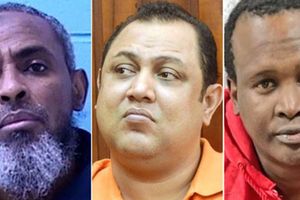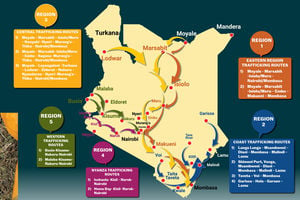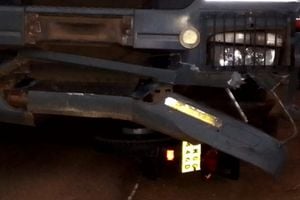
Brothers (from left) Baktash Akasha, Ibrahim Akasha, Abdulsalam Akasha when at a past court session.
The family of slain drug baron Ibrahim Akasha will have to wait a little longer to know whether multi-million-worth of items recovered from their house during Baktash Akasha's arrest will be returned to them.
This follows an application by the State to block another filed by Ibrahim’s widow Fatma Akasha and her daughter-in-law Najma Juma Hassan (Baktash's wife) for the release of the items.
Some of the items in State custody include 11 shotguns, a Taurus pistol, three Ceska magazines loaded with 16 rounds of ammunition, 25 rounds of ammunition, seven iPhones, 10 gold chains, five logbooks, and checkbooks, among other items.
On November 8, last year, the High Court granted the State 60 days to initiate forfeiture proceedings for the items, but it failed to do so.
The women then approached the court in May this year, prompting the State to act just as (the court) was set to deliver a ruling that would have returned the items to the family.
The women filed their application on May 24. They contended that the State had not initiated forfeiture proceedings and requested the immediate release of the items to them.
“The items in question were never used as exhibits in the extradition proceedings of Baktash and Ibrahim Akasha to the United States (US). We pray that the items be released to us,” they stated.
They referenced the judgment delivered by Justice Eric Ogola last year, which mandated the State to initiate forfeiture proceedings within 60 days, failure to which, the women would be entitled to apply for the release of all the items and properties in question.
“As of May 24, 2024, when we filed this application, no forfeiture proceedings had been initiated by the State; consequently, we ask that the said items be released to us immediately,” the women said.
Court records indicate that the case proceeded with only the women as parties and was scheduled for a ruling on July 3.
However, the Office of the Director of Public Prosecutions (ODPP) became aware of the matter and approached the court with two applications in June.
ODPP prayers
The first application sought a review and the setting aside of the judgment delivered by Justice Ogola last year, while the second application requested a stay of the ruling to allow for the rehearing and determination of the women’s application.
The ODPP also requested an extension of time to enable it to file a response to the women’s application.
In effect, the ODPP sought to reopen the proceedings related to the petitioners’ application, including the setting aside of the earlier proceedings whose ruling was scheduled for July 3.
“It is in the public interest for the proceedings regarding the petitioner’s application to be reopened,” the ODPP argued.
The explanation provided by the ODPP for its non-attendance of the case on June 20, 2024, was that there had been miscommunication among the advocates representing the State agencies in the matter.
Mombasa Resident Judge Olga Sewe ruled in ODPP’s favour, noting that the explanation it provided for non-attendance was sufficient to warrant the reopening of the proceedings in the case filed by the women.
The judge further noted that the ODPP’s explanation was not contested by the petitioners, as no response was filed to the subject application and neither the women nor their advocates attended the court on July 9, when the prosecution’s application was heard.
Read: Nyanza clerics threaten to mobilise civil disobedience over alleged oppression by Ruto government
“Accordingly, the explanation given by the ODPP for non-attendance on June 20, 2024 is entirely uncontroverted and is, in my careful consideration, plausible. I find merit in its second application and hereby allow it,” said the judge.
The judge issued further orders setting aside the proceedings and orders made on June 20, 2024, and granting leave to the ODPP to file a response to the petitioners’ application.
The court allowed both the State and the petitioners to file their respective documents in support of and opposition to the applications for the release of the items.
“The ODPP’s first application, seeking to set aside the decision of Justice Ogola, shall be kept in abeyance pending further orders of the court upon disposal of the petitioners’ application,” said Justice Sewe.
The women have been fighting in court to recover items worth millions of shillings, which were seized by police during the arrest and extradition of Baktash and his brother Ibrahim to the United States over six years ago.
Ibrahim (shares the name with their slain father) is serving a 23-year jail term after pleading guilty to trafficking heroin and methamphetamine into the US, among other crimes.
His brother Baktash was imprisoned for 25 years by the United States District Court of New York on August 16, 2019.
The women argue that some items seized and recorded in an inventory dated November 9, 2017, were never used as exhibits in the extradition proceedings that have already concluded in the US and remain in the custody of a few police officers handling the matter.
“The continued detention of the properties by a multi-agency team under the pretext of being used in the extradition proceedings is untenable and illegal,” reads part of their documents.
They have also stated that none of the items held by Kenyan authorities were used as exhibits during the convicts’ trial at Southern District Court in New York for the offense of conspiracy to import narcotics in the US.
They lamented that after the extradition process, only some of the seized items, including birth certificates, passports, and identity cards belonging to the convicts, were returned to them.











